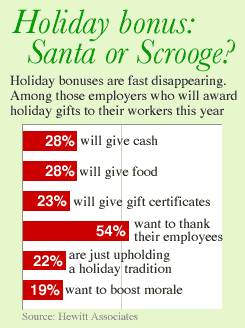NEW YORK (CNN/Money) - John Riley never second-guessed his decision to give his employees cash for the holidays.

Workers earned $25 for each quarter they had been with his human resources consulting firm, or $100 a year.
But it wasn't long, says Riley, before staffers viewed the money as an "entitlement" they were owed, not a gift to recognize service.
When Riley sold his company and began a different human resource firm a few years ago, he seized the opportunity to do things differently. Today, staffers at his Orlando-based firm, Co-Advantage, get hams for the holidays.
"People would stick around to the end of the year to get the bonus then quit after Christmas," explains Riley. "The program worked against us.
"Now, it's not like someone's going to stick around for a ham, but they're still excited to get it," he says. "They can share it with their families."
What's happened at Co-Advantage is happening at companies nationwide, according to a survey released Tuesday by Hewitt Associates.
This year, says Hewitt, only 35 percent of employers will give some sort of holiday bonus, including cash, food or gift certificates.

Instead, far more employers -- eight out of 10 -- are funding performance-based bonuses that reward only the best workers. The message: just logging hours isn't enough to warrant a holiday surprise.
"Most organizations are seeking a direct connection between performance and awards," says Ken Abosch, a business leader at Hewitt. They're "focusing on variable pay incentives, which are designed to help employees concentrate on company goals and objectives while eliminating entitlement issues that often arise with a holiday bonus plan."
Bah, humbug!
If you're hankering for the good ol' days of corporate largesse, consider this: Holiday bonuses have never been that popular. Hewitt found that 47 percent of employers have never given them.
In those benevolent workplaces where holiday bonuses were once an annual rite, however, the tradition is changing quickly.
In fact, 52 percent of employers who've scuttled their holiday bonus programs have done so since 2000, and 42 percent eliminated their holiday cash awards back in the 1990s.
Employers are quick to point out they aren't entirely playing Scrooge. For one thing, they argue, holiday bonuses never made anyone rich, except on Wall Street.
This year, those employers that do pay cash will spend a median $300 per employee on cash holiday gifts, according to the Hewitt survey. They'll plunk down $20 for food gifts, such as hams and turkeys. Those who give away gift certificates will generally spend $25 per worker.
Paying more for talent
Another trend in this tight-fisted age is the rise of performance-based bonuses. Also known as "short-term incentives," they can be worth far more than any of these holiday gifts.
"If someone was been with us for five to 10 years, they would have received $500 to $1000," says Riley, who started his performance-based bonus program after he evaluated the efficacy of his old holiday cash gifts. "Now, they make much more than that under the new compensation program."
Top performers may also get gifts as well as a bonus.
At DBG Promotions, a corporate gift consultant, employers are "loosening up the reins" a bit to buy more expensive gifts for top workers, says David Goggin, the firm's president.
"The Odyssey two-ball putter with a sleeve of Callaway golf balls is the big thing this year," says Goggin, who's also selling a lot of Waterman pens, Swiss Army watches and leather jewelry cases. "My sense is that people are concentrating on name brands. Last year they were looking for value."

|

